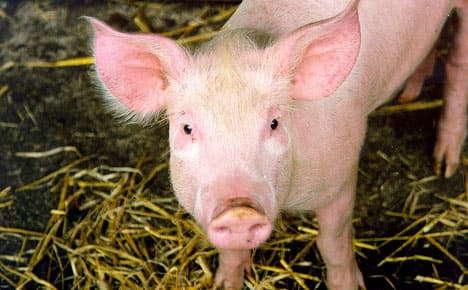Over a dozen babies infected with MRSA

In light of revelations that at least 13 children whose parents work in the swine industry have been infected with MRSA, a leading expert calls the authorities' approach 'unsustainable'.
Leading experts warned in August that up to 12,000 Danes could be infected with antibiotic-resistance MRSA and now there is evidence that the infections have spread to society’s weakest members: newborn babies. Tinna Urth, a hygienic nurse with the North Denmark Region’s MRSA unit and a consultant to the Danish State Serum Institute (SSI), told Ingeniøren on Thursday that at least thirteen infants in northern Jutland have been infected with the bacteria. In all instances, the children’s parents work in the swine industry. Urth said that six newborns contracted eye infections while four others received outer ear infections. Urth said she was also aware of three other small children who have been infected with MRSA. “Through swabbing we have discovered that MRSA 398 is the cause of the infections,” she told Ingeniøren. See also: Up to 12,000 infected with MRSA: experts The findings cast doubt on the government’s strategy to contain MRSA, a professor of clinical microbiology at the University of Southern Denmark told DR. “It isn’t sustainable to say that the strategy is to try and prevent the bacteria from getting out of the pig houses,” Hans Jørn Kolmos said. Kolmos said that small children are especially susceptible to MRSA. “Staphylococcus is attracted to infants like flies to honey,” he said. Kolmos concluded in August that between 6,000-12,000 people are infected with MRSA CC398, a variant that can be transmitted from livestock to humans. CC398 has seen a massive increase in Denmark over the past seven years. According to SSI, the CC398 variant only accounted for two percent of all MRSA cases in 2007 but this year it is up to 35 percent. The professor has been very critical of MRSA response from both the Danish Food and Veterinary Administration (Fødevarestyrelsen) and the Danish Health and Medicine Authority (Sundhedsstyrelsen). “Both Fødevarestyrelsen and Sundhedsstyrelsen have massively failed in this instance. They, for one reason or another, have neglected the problem from the start and one is tempted to ask if the authorities are more loyal to the pig industry than to the people who risk becoming ill and even dying from swine MRSA,” Kolmos told Politiken in August.
Comments
See Also
Leading experts warned in August that up to 12,000 Danes could be infected with antibiotic-resistance MRSA and now there is evidence that the infections have spread to society’s weakest members: newborn babies.
Tinna Urth, a hygienic nurse with the North Denmark Region’s MRSA unit and a consultant to the Danish State Serum Institute (SSI), told Ingeniøren on Thursday that at least thirteen infants in northern Jutland have been infected with the bacteria. In all instances, the children’s parents work in the swine industry.
Urth said that six newborns contracted eye infections while four others received outer ear infections. Urth said she was also aware of three other small children who have been infected with MRSA.
“Through swabbing we have discovered that MRSA 398 is the cause of the infections,” she told Ingeniøren.
See also: Up to 12,000 infected with MRSA: experts
The findings cast doubt on the government’s strategy to contain MRSA, a professor of clinical microbiology at the University of Southern Denmark told DR.
“It isn’t sustainable to say that the strategy is to try and prevent the bacteria from getting out of the pig houses,” Hans Jørn Kolmos said.
Kolmos said that small children are especially susceptible to MRSA.
“Staphylococcus is attracted to infants like flies to honey,” he said.
Kolmos concluded in August that between 6,000-12,000 people are infected with MRSA CC398, a variant that can be transmitted from livestock to humans.
CC398 has seen a massive increase in Denmark over the past seven years. According to SSI, the CC398 variant only accounted for two percent of all MRSA cases in 2007 but this year it is up to 35 percent.
The professor has been very critical of MRSA response from both the Danish Food and Veterinary Administration (Fødevarestyrelsen) and the Danish Health and Medicine Authority (Sundhedsstyrelsen).
“Both Fødevarestyrelsen and Sundhedsstyrelsen have massively failed in this instance. They, for one reason or another, have neglected the problem from the start and one is tempted to ask if the authorities are more loyal to the pig industry than to the people who risk becoming ill and even dying from swine MRSA,” Kolmos told Politiken in August.
Join the conversation in our comments section below. Share your own views and experience and if you have a question or suggestion for our journalists then email us at [email protected].
Please keep comments civil, constructive and on topic – and make sure to read our terms of use before getting involved.
Please log in here to leave a comment.